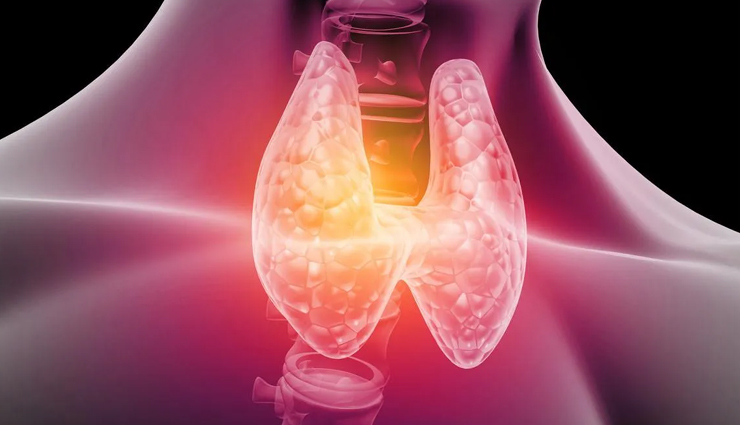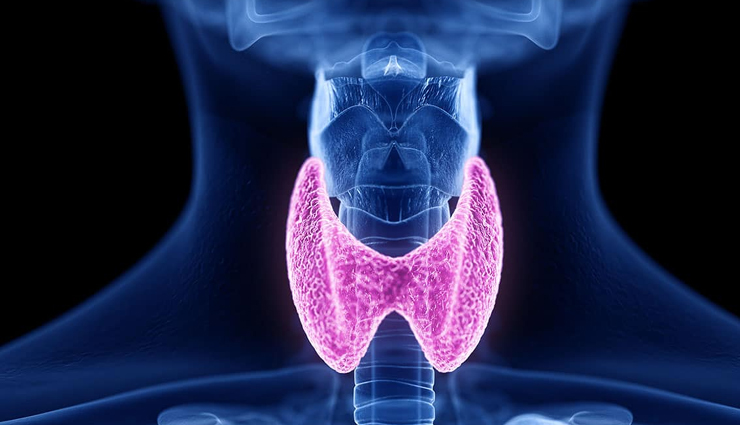- Home›
- Healthy Living›
- 5 Major Types Of Thyroid To Know About
5 Major Types Of Thyroid To Know About
By: Priyanka Maheshwari Fri, 24 May 2024 11:50:41

The thyroid gland, a butterfly-shaped organ located in the front of the neck, plays a crucial role in regulating various bodily functions. Primarily responsible for producing hormones that control metabolism, the thyroid impacts almost every cell in the body. These hormones influence vital processes such as heart rate, body temperature, energy levels, and even mood.
Thyroid function is tightly regulated by feedback mechanisms involving the hypothalamus and pituitary gland in the brain. When thyroid hormone levels drop, the hypothalamus releases thyrotropin-releasing hormone (TRH), which signals the pituitary gland to release thyroid-stimulating hormone (TSH). TSH then prompts the thyroid gland to produce more thyroid hormones—primarily thyroxine (T4) and triiodothyronine (T3). These hormones regulate metabolism by influencing the rate at which cells use energy.
Disorders of the thyroid gland can lead to either overproduction or underproduction of thyroid hormones, resulting in various health complications. Hyperthyroidism occurs when the thyroid gland produces excessive hormones, leading to symptoms such as weight loss, rapid heartbeat, anxiety, and tremors. Conversely, hypothyroidism occurs when the gland produces insufficient hormones, causing fatigue, weight gain, depression, and sluggishness.
Thyroid disorders are commonly diagnosed through blood tests measuring hormone levels and other diagnostic imaging techniques. Treatment options vary depending on the specific condition but may include medication, radioactive iodine therapy, or surgery.

# Hypothyroidism: This condition occurs when the thyroid gland doesn't produce enough thyroid hormones. Causes can include autoimmune diseases like Hashimoto's thyroiditis, thyroid surgery, radiation therapy, or certain medications. Symptoms may include fatigue, weight gain, constipation, dry skin, and sensitivity to cold.

# Hyperthyroidism: Hyperthyroidism is the opposite of hypothyroidism, characterized by excessive production of thyroid hormones. Graves' disease, an autoimmune disorder, is the most common cause. Other causes include thyroid nodules or inflammation of the thyroid gland (thyroiditis). Symptoms may include weight loss, rapid heartbeat, anxiety, tremors, and heat intolerance.

# Thyroid Nodules: Thyroid nodules are abnormal growths or lumps that develop within the thyroid gland. While most nodules are benign (non-cancerous), some can be cancerous. Thyroid nodules may or may not produce thyroid hormones and often don't cause symptoms unless they become large enough to press on nearby structures or produce excess hormones.

# Thyroid Cancer: Thyroid cancer develops when abnormal cells within the thyroid gland grow and divide uncontrollably. It is relatively uncommon compared to other types of cancer but is usually treatable, especially when diagnosed early. There are different types of thyroid cancer, including papillary, follicular, medullary, and anaplastic thyroid cancer, each with its own characteristics and treatment approaches.
# Thyroiditis: Thyroiditis refers to inflammation of the thyroid gland, which can lead to either temporary hyperthyroidism (due to leakage of stored hormones) or hypothyroidism (due to damage to thyroid cells). It can be caused by viral or bacterial infections, autoimmune diseases, or certain medications. Symptoms vary depending on the type of thyroiditis but may include neck pain, fever, fatigue, and thyroid enlargement.





